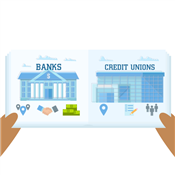Nationwide Credit Unions
Exploring options beyond traditional banks? Consider these nationwide credit unions.
PRO TIP: Right now, one of the best credit union savings rates can be found with with an impressive APY. You can open an account with just $1 and start earning interest right away.
Here are the best nationwide credit unions:
Credit unions are a popular choice today for their attractive products, personalized services, and great rates. And, they are much easier to access now than it was before.
So, if you're interested, check out these nationwide credit unions and see if you're eligible to join one.
8 Best Nationwide Credit Unions
Credit unions serve as good alternatives to traditional banks. Here are some of the best nationwide credit unions to consider:
 |
Alliant Credit Union
Alliant Credit Union was established in 1935 by United Airlines employees to save money and get loans at reasonable rates. Now, they offer a variety of financial products like savings, credit cards, checking, loans, insurance, and more.
How to be a member:
The easiest way to join is to become an Alliant digital inclusion advocate for just $5. Or, check if you meet the eligibility requirements.[1]
Why We Like It
Alliant Credit Union has a high-yield savings account with a solid APY, a low minimum balance of $100, and no monthly fees with e-statements.[2]
They also have an interest-bearing checking account that boasts $0 monthly service fees and no balance requirements. Plus, account holders get access to over 80,000 fee-free ATMs.[3]
Pros + Cons
|
|
Alliant Credit Union: High-Rate Checking
- 0.25% APY when you opt in to eStatements and have at least one monthly electronic deposit to your account
- No monthly service fee
- No minimum balance requirement
- Up to $20/month in ATM fee rebates
Alliant Credit Union: High-Rate Savings
- 3.01% APY when you maintain average daily balance of $100 or more
- No monthly fee when you opt in to eStatements
- $5 initial deposit
Pentagon Federal Credit Union
Pentagon Federal Credit Union, originally established as the War Department Federal Credit Union in 1935, is one of the largest credit unions in the US.[4]
They have a wide array of financial products like credit cards, deposit accounts, IRAs, certificates, loans, and more.
How to be a member:
PenFed membership is open to everyone. But, you need to open a PenFed savings account with just $5.[5]
Why We Like It
PenFed provides a high-yield savings account with a good APY, no monthly fees, and a low $5 opening deposit.[6] Their free checking account also features fee-free access to over 85,000 ATMs, with no monthly fees, no minimum balance, and an opening deposit of only $25.[7]
Pros + Cons
|
|
Pentagon Federal Credit Union: Premium Online Savings Account
- 2.70% APY
- $5 minimum to open
- No monthly maintenance fee
- Free online transfers
- NCUA insured
Pentagon Federal Credit Union: Free Checking
- $25 minimum opening deposit
- No monthly fee
- No minimum balance requirements
Consumers Credit Union
Consumers Credit Union was started in 1930 to provide financial assistance during the Great Depression. Now they have become an established institution known for their commitment to meet the financial needs of their members.[8]
They offer various products and services such as checking, savings, debit and credit cards, certificates, loans, and more.
How to be a member:
Anyone can join by paying a one-time $5 membership fee to the Consumers Cooperative Association. And, you need to open and maintain a minimum of $5 in your savings account.[9]
Why We Like It
CCU has Rewards Checking that lets you earn a high APY on balances up to $10,000 when you meet specific requirements. Plus, it has no monthly fees, unlimited check-writing, and access to over 30,000 ATMs and 5,000 shared branches.[10]
Pros + Cons
|
|
Free Rewards Checking
- Earn up to 5.00% APY*
- Unlimited reimbursement for any and all ATM fees**
- Over 30,000 ATMs & over 5,000 shared branches
- No monthly maintenance fees
- No minimum balance
Connexus Credit Union
Connexus Credit Union is a popular institution that focuses on giving members good returns on banking products and competitive loan rates. They're also committed to leading in technology through their excellent digital banking platform.
How to be a member:
Just join the Connexus Association and make a one-time $5 donation to be a member.[11]
Why We Like It
Connexus offers a high-yield checking account called Xtraordinary with a decent APY. It comes with no maintenance fees, no ATM fees, and no minimum balance requirements. Plus, you can access digital banking tools and over 67,000 surcharge-free ATMs.[12]
Pros + Cons
|
|
Navy Federal Credit Union
Established in 1933, Navy Federal Credit Union is one of the largest credit unions in the US. They serve around 14 million members, exclusively focusing on the military, veterans, and their families.[13]
How to be a member:
Unfortunately, membership is not open to everyone. You need to be one of the following: on active duty or a retired service member, veteran, family member, or Department of Defense civilian.
Why We Like It
Navy Federal offers a Free EveryDay Checking account with no monthly service fee, no opening deposit requirement, and no minimum balance. It also comes with a user-friendly digital banking platform and access to over 30,000 ATMs with their debit card.[14]
Pros + Cons
|
|
SkyOne Federal Credit Union
SkyOne Federal Credit Union has been serving its members for over 70 years since 1949. They provide a wide variety of financial products like deposit accounts, IRAs, credit, loans, and more.[15]
How to be a member:
The simplest way to be a member is to join Friends of Madrona Marsh (for Southern California residents) or Surfrider Foundation (all other locations) if you don't meet their eligibility requirements.[16]
Why We Like It
SkyOne offers a high-yield savings account with a decent APY. It has no monthly fees, and you can open an account with just $1.[17]
Plus, you get to enjoy convenient access to your funds with over 66,000 fee-free ATMs, 4,000 shared branches, and user-friendly online banking platforms.
Pros + Cons
|
|
Blue Federal Credit Union
Blue Federal Credit Union was created by combining two successful credit unions with rich histories. Blue's combined expertise provides top-notch financial products and services.
How to be a member:
You can easily join their membership by donating to the Blue Foundation upon opening an account.[18]
Why We Like It
Blue offers an Accelerated Savings account with a competitive APY on balances up to $1,000. It follows a tiered structure so you can earn dividends based on your balance. Additionally, there's no need for monthly transfers to qualify.[19]
Pros + Cons
|
|
Credit Unions Versus Banks
While credit unions and banks may appear similar at first glance, they are quite different. Here are some characteristics that make credit unions distinct from banks:[20]
- Credit Unions are nonprofit.
Banks are owned by shareholders to make money, while credit unions are owned by members and run as nonprofits. Credit unions also prioritize members' financial health, often giving back earnings to the community through better rates and fewer fees. - Credit Unions serve members.
Anyone can be a bank customer, but to access a credit union's products and services, you must become a member. This usually involves meeting criteria such as living in a specific area, having a particular job, belonging to a group, or being related to an existing member. - Credit Unions offer member-focused products.
While credit unions and banks typically offer similar financial products, credit unions stand out by providing more personalized and community-focused services. This is because their main goal is to ensure that the needs of their members are satisfied. - Credit Unions are NCUA-insured.
Both banks and credit unions share a similarity in being federally insured by the US government. Banks are safeguarded by the FDIC, while credit unions are protected by the NCUA.
This depends on what your financial preferences are. For good rates and lower fees, credit unions may offer better options. But for convenience and accessibility, banks might be a better choice. Some online banks might also offer good rates.
Pros and Cons of Credit Unions
Pros
- Little to no fees
- High APY on deposit accounts
- Low interest rates on loans
- Personalized products and services
- Owned by members
- NCUA-insured
Cons
- Membership requirements
- Limited physical locations and ATMs
- Fewer products and services offered
How to Choose Best Nationwide Credit Union
Here are things to think about when choosing the right credit union:
- Membership Eligibility
To access a credit union's products and services, you need to become a member first. So, look for one with eligibility requirements you can meet. - Fees and Other Costs
Credit unions usually have lower fees than banks, but it's smart to compare before choosing one. This way, you can find a credit union that fits your financial situation. - Products and Services Catalog
Check the range of products and services the credit union provides. Choose one that offers banking products that align with your goals and preferences in the long run. - Interest Rates
Similar to banks, it's crucial to consider the interest rates when choosing a credit union. Opt for one with a competitive APY on deposit accounts and low rates on loans to maximize your financial benefits. - Customer Support
Good customer support is crucial for banks and credit unions alike. So, choose an institution that can address your questions and assist you if any issues arise with your account.
Yes, credit unions can be worth it because they offer similar services to banks but with lower fees and better interest rates. As non-profits, they prioritize helping their members, resulting in more personalized service. Most are also NCUA-insured, keeping your money safe.
How to Join a Credit Union
Credit unions have specific membership requirements and processes, so it's wise to research beforehand. Here's what you need to know to join a credit union:
- Check if you qualify to join the credit union you're considering. Many have specific eligibility rules based on where you live, work, study, or worship, and some may require a one-time donation to a foundation or cause.
- Gather the necessary information and documents. Most credit unions require basic details like your name, address, contact info, government ID, and SSN, similar to opening a bank account.
- Apply for membership and open an account. Once that's done, just make your initial deposit.
What the Experts Say
CreditDonkey asked a panel of industry experts to answer readers' most pressing questions. Here's what they said:
FAQs
Are credit unions insured?
Yes, credit unions are federally insured by the National Credit Union Administration or the NCUA. Thus, members are insured up to $250,000 per depositor for each ownership category.[21]
Do credit unions pay more interest than banks?
Not always. However, credit unions typically provide more attractive rates on savings accounts because of their nonprofit nature.
Do credit unions build credit scores?
Yes, credit unions can help you build your credit score because it's often easier to get a credit card through them. They also offer lower interest rates and fewer fees on credit cards and loans, making it easier to manage your finances.
Do credit unions have ATMs?
Yes. Credit unions often work with specific ATM networks, so you can use their ATMs to withdraw cash.
Bottom Line
While credit unions are often associated with many requirements, becoming a member for some is now simpler. Numerous institutions are open to everyone nationwide, providing easier access to excellent financial products and services.
If you want to deviate away from traditional banking, credit unions make for a great alternative.
References
- ^ Alliant Credit Union. Who is eligible to join Alliant?, Retrieved 02/12/2024
- ^ Alliant Credit Union. High Yield Savings, Retrieved 02/11/2024
- ^ Alliant Credit Union. High Yield Checking Account, Retrieved 02/12/2024
- ^ Pentagon Federal Credit Union. About, Retrieved 02/12/2024
- ^ PenFed Credit Union. Membership in 3 Easy Steps, Retrieved 02/12/2024
- ^ Pentagon Federal Credit Union. Premium Online Savings, Retrieved 02/12/2024
- ^ Pentagon Federal Credit Union. Free Checking, Retrieved 03/25/2024
- ^ Consumers Credit Union. The Story of CCU, Retrieved 02/12/2024
- ^ Consumers Credit Union. Membership, Retrieved 02/12/2024
- ^ Consumers Credit Union. Free Rewards Checking, Retrieved 02/12/2024
- ^ Connexus Credit Union. Membership Eligibility, Retrieved 02/12/2024
- ^ Connexus Credit Union. Checking Accounts, Retrieved 03/25/2024
- ^ Navy Federal Credit Union. Corporate Fact Sheet, Retrieved 03/25/2024
- ^ Navy Federal Credit Union. Checking Accounts & the Navy Federal Debit Card, Retrieved 03/25/2024
- ^ SkyOne Federal Credit Union. About Us, Retrieved 02/12/2024
- ^ SkyOne Federal Credit Union. Membership Application, Retrieved 02/12/2024
- ^ SkyOne Federal Credit Union. Sky-High Savings Account, Retrieved 03/25/2024
- ^ Blue Federal Credit Union. Who can join, Retrieved 02/12/2024
- ^ Blue Federal Credit Union. Savings, Retrieved 02/12/2024
- ^ MyCreditUnion.gov. What is a Credit Union?, Retrieved 02/12/2024
- ^ NCUA. Deposits Are Safe in Federally Insured Credit Unions, Retrieved 02/12/2024
Write to Darlene Santos at feedback@creditdonkey.com. Follow us on Twitter and Facebook for our latest posts.
Note: This website is made possible through financial relationships with some of the products and services mentioned on this site. We may receive compensation if you shop through links in our content. You do not have to use our links, but you help support CreditDonkey if you do.
|
|
| ||||||
|
|
|







